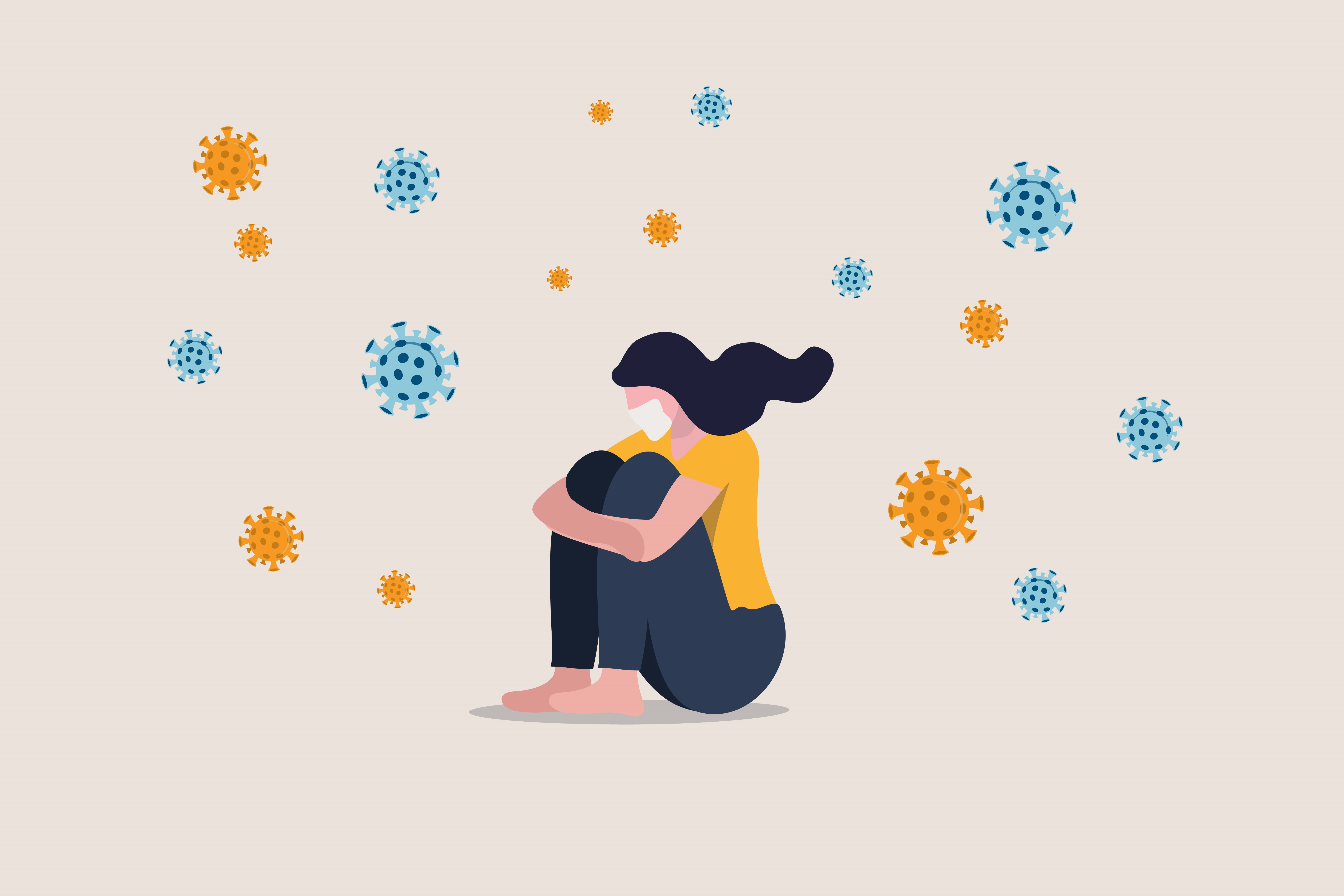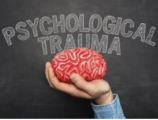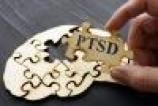Coping with Grief and Trauma During the Pandemic
Coping with Grief and Trauma During the Pandemic

“There is a post-pandemic wake of communal grief occurring as we watch our work, health-care, education and economic systems – all of these systems we depend on – destabilize.”
“The loss includes our sense of predictability, control, justice, and the belief that we can protect our children or elderly loved ones.” Robert Neimeyer, PhD
On our pandemic journey over the last 18 months, we have endured fear, uncertainty, unfamiliarity, chance, risk, and mistakes. As a society we have suffered as individuals and as a collective.
As of June 2020:
- 13% of Americans reported starting or increasing substance use as a way of coping with stress or emotions related to COVID-19.
- We had seen an 18% increase nationwide in overdoses compared with the same months in 2019.
August 2020-February 2021:
- Adults with recent symptoms of anxiety or a depressive disorder increased from 36.4% to 41.5%
- Those reporting an unmet mental health care need increased from 9.2% to 11.7%.
(Centers for Disease Control and Prevention and American Medical Association)
Now on the rebound, we are hoping that this is the calm after the storm, even though the next variant or spike in positive cases always seems to be looming around the corner. It is no wonder we have experienced higher than usual levels of anxiety, depression, and maladaptive coping behaviors (substance use, risky behavior, eating disorders, suicidal ideation, self-harm, among others). Now is a time, more than ever, for us to talk about grief and trauma and how it affects us and our connections with others and the world around us.
Grief
As a result of this collective pandemic experience, more of us have experienced loss, both expected and unexpected. Grieving our losses over the last 18 months is critical to our individual and collective well-being. We all need the space, support, and time to grieve, whatever our losses, be they loved ones, relationships, lifestyles, or overall functioning. We all have endured enough to allow ourselves the right to grieve.
We all know we will experience grief and its many moods in our lifetimes. We all have loved and lost. Death, divorce, moving, retirement, and similar life changes affect us all at some point. For expected losses, grieving commonly takes place before, during, and after the loss. The experiences of grief heighten in both intensity and duration, however, when we face unexpected losses, such as untimely/tragic death, loss of pregnancy, loss of health, abrupt endings, job termination, loss of home, loss of safety, etc. But our experiences of both expected and unexpected grief can push us into a vulnerable and high-risk space. We all need to cope with our feelings, especially the challenging and negative ones.
Common grief responses can include:
- Difficulty concentrating
- Feeling sad or depressed
- Irritability and anger
- A desire to escape
- Ambivalence
- Guilt or remorse
- Gastrointestinal distress
- Apathy
- Fatigue
- Loss or increase in appetite
Trauma
Not all grief is created by or becomes trauma, but all trauma creates and becomes grief. Trauma is, “an incident that causes physical, emotional, spiritual, or psychological harm. The person experiencing the distressing event may feel physically threatened or extremely frightened as a result.” (American Psychological Association).
Factors that lead grief to become trauma during a pandemic can include:
- Adverse environments: discrimination, racism, micro-aggressions, “othering”
- Trauma cascade: repeated traumatic losses and trauma events that affect the person or a group over a period
- Current and past mood and anxiety disorders
- History of invalidating, high conflict, or abusive relationships
- Inability or lack of knowing how to cope and use skills
- Lack of support system and willingness/ability to adapt based on situation
- Dominance of threat versus safety states: a prolonged state of threat can be a risk factor of developing post-traumatic stress
- Limited access to healthcare
When our bodies experience trauma, they want to protect the most important thing, our safety and well-being. Our bodies and minds’ ways of protecting ourselves depend on threat and fear signals. When we have endured trauma, our bodies and brains will try to prevent it from happening again and so will heighten our perceptions and create a more sensitive threat monitor. Our brains start to see sticks as snakes and unknowns or surprises as life threatening situations. This is called the “threat” cue state and when we have faced trauma or adverse conditions or experiences, we tend to live in this cue state as a means of survival. If you are in the threat state you may experience panic, fear, anxiety, worry, rage, anger, irritation, frustration, and other similar emotions. You may also be pushed into the “overwhelm” state where you feel dissociated, numb, depressed, trapped, helpless, elevated levels of shame, shut-down, hopelessness. When in the “threat” or “overwhelm” state you may experience what we call, “Fight, Flight, or Freeze” responses.
Resilience
How do we manage these feelings of grief and trauma when we are faced with seemingly endless rounds of uncertainty, doubt, and fear? We need to create a lifestyle and experiences that involve safety. We can create the “safety” cue state by finding social engagement, joy, mindfulness, groundedness, curiosity, openness, compassion, and other positive feelings. Through our own resiliency and by tapping into the resiliency of our communities we can find that Safety state. Psychological resilience encompasses embracing experiences and being adaptable, flexible, connected, purposeful, and sustained by hope. Community resilience reflects the ability of individuals and households within a community to absorb, endure, and recover from the impacts of a disaster.
Trauma-Informed Lifestyle
Reaching these states of resilience depends on building a trauma-informed lifestyle and values system that can help manage the grief and consequent trauma that we may be experiencing due to the pandemic. A trauma-informed approach includes: 1) realizing the prevalence of trauma, 2) recognizing how trauma affects all individuals involved in a home, community, or organization, 3) responding by putting knowledge into practice.
To this end, we can prioritize building the values of safety, trust, choice, collaboration, empowerment, and inclusion. We can adopt the idea of “Brave Space.” In a Brave Space we face situations with a willingness to be uncomfortable and safe, rather than comfortable and unsafe, comfortable and safe, or uncomfortable and unsafe. We embrace that being challenged while in a safe situation and space can lead to growth and empowerment. In a Brave Space we can build those values of safety, trust, choice, collaboration, empowerment, and inclusion. We can find healing, space to grow and learn, and build resilience to adverse conditions and experiences like the pandemic. Within a Brave Space, we can experience Post-Traumatic Growth (PTG), a construct of positive psychological change that occurs as the result of our purposeful struggles with a highly challenging, stressful, and traumatic event. And with PTG, we can move traumatic pandemic experiences beyond a focus on loss, using them to strengthen our resilience to continued uncertainty.
Things you can do today to live a trauma informed lifestyle:
- Remember compassion for others: consider where they may be coming from.
- Remember compassion for yourself: give yourself space and time to grieve and mourn your losses, whatever their scale.
- Process experiences: ask yourself what happened versus why you are feeling this way.
- Reach out for help when you are struggling with emotions, thoughts, and behaviors.
References:
- Centers for Disease Control and Prevention. (2018, December 6). The continuum of pandemic phases. CDC. Retrieved from https://www.cdc.gov/flu/pandemic-resources/planning-preparedness/global-planning-508.html
- Bonanno, G. A. (2004). Loss, Trauma, and Human Resilience: Have We Underestimated the Human Capacity to Thrive After Extremely Aversive Events? American Psychologist, 59(1), 20–28. https://doi.org/10.1037/0003-066X.59.1.20
- Lynch, Thomas, (2018). The Skills Training Manual for Radically Open Dialectical Behavior Therapy: A Clinical Guide for Treating Disorders of Overcontrol. New Harbinger Publications.
- Porges, Stephen, Dana, Deb (2018) Clinical Applications of the Polyvagal Theory. W.W. Norton & Company.
- Weir, K. (2020). Grieving life and loss. American Psychological Association. Volume 51 (No. 4)



















